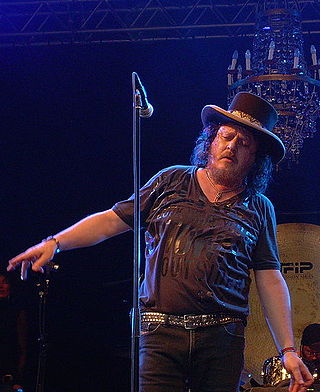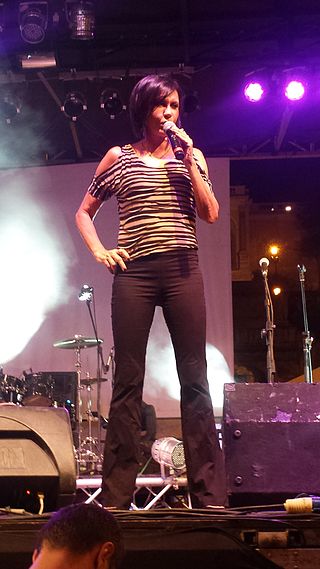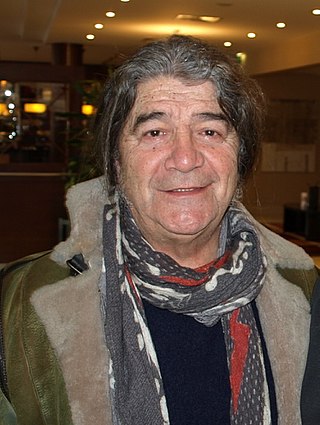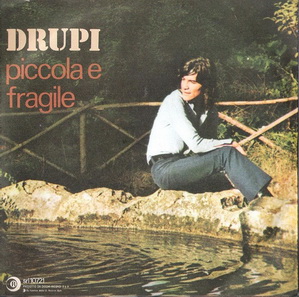
Adelmo Fornaciari, more commonly known by his stage name Zucchero Fornaciari or simply Zucchero, is an Italian singer, musician and songwriter. His stage name is the Italian word for "sugar", as his primary school teacher used to call him. His music is largely inspired by gospel, soul, blues and rock music, and alternates between Italian ballads and more rhythmic R&B-boogie-like pieces. He is credited as the "father of Italian blues", introducing blues to the big stage in Italy. He is one of the few European blues artists who still enjoys great international success.

"Luce (Tramonti a nord est)" (translating to 'Light (Sunsets in the North-East)') is a song by Italian singer-songwriter Elisa released on 6 March 2001 as the fourth and final extract from the second studio album Asile's World by Sugar Music. The English version of the song, "Come Speak to Me" was published in 2002.

Teresa Presmanes Corona, known professionally as Daniela Romo, is a Mexican singer, actress and TV hostess. During her career, she has sold 15 million records, making her one of the best-selling Latin music artists.

The discography of Zucchero, an Italian rock blues singer-songwriter, consists of 15 studio albums, one soundtrack album, seven compilation albums, two live albums and more than sixty singles. In 1993, Zucchero has also released a studio album with the band Adelmo e i suoi Sorapis, also including Equipe 84's Maurizio Vandelli and Pooh's Dodi Battaglia.

Amor Prohibido is the second studio album by Mexican pop singer Daniela Romo. This album was released in 1984.
"Canzone per te", written by Italian composer Sergio Endrigo. The song won the 1968 edition of the Sanremo Music Festival, with a double performance by Endrigo and Roberto Carlos.

Marina Fiordaliso, best known as Fiordaliso, is an Italian pop rock singer. During her career she has sold over 6 million records.

Giampiero Anelli, best known as Drupi, is an Italian rock singer, best known for the songs "Vado via", "Piccola e fragile", "Sereno è" and "Due".
The Castrocaro Music Festival, also known as Concorso per Voci Nuove, is an Italian musical contest which takes place every year in the town of Castrocaro Terme e Terra del Sole, near Forlì, from 1957. The competition is exclusively reserved for new talents, and it had its maximum popularity from 1962 to early Eighties when, under the direction of Gianni Ravera, based on an agreement with the Sanremo Music Festival the top two finishers of the competition gained the access to the Sanremo Festival. Singers who were launched by the event include Gigliola Cinquetti, Iva Zanicchi, Zucchero Fornaciari, Fiordaliso, Caterina Caselli, Laura Pausini, Eros Ramazzotti, Franco Simone and Alice. Winners of the singing kermesse who have subsequently become famous include singer-songwriter Giuni Russo (1967), Gigliola Cinquetti (1963), Alice (1971), Michele Zarrillo (1979), Luca Barbarossa (1980), Zucchero Fornaciari (1981), Fiordaliso (1981), Donatella Milani (1982) and Silvia Salemi (1995).

A sequel to the six-times platinum Via Dalma, Sergio Dalma's Via Dalma II reunited the pop singer with producer Claudio Guidetti and continued with the same format: Spanish-language versions of popular Italian songs. The disc was almost as successful as its predecessor, spending five weeks at No. 1 on the official chart released by Productores de Música de España and achieving quadruple platinum status after spending 49 weeks on the chart.

Luigi (Gino) De Crescenzo, best known as Pacifico, is an Italian singer-songwriter, composer and musician.
Luigi Albertelli was an Italian songwriter and television author.
Vincenzo Malepasso, best known as Enzo Malepasso, was an Italian composer, singer and record producer.

Black Cat is the thirteenth studio album by the Italian blues rock singer-songwriter Zucchero Fornaciari, released on 29 April 2016. It's his first full-length studio album in six years, after Chocabeck in 2010, given that La Sesión Cubana (2012) was a mix of unreleased, previously released and cover songs.

Cosimo Cavallo, best known as Mimmo Cavallo, is an Italian singer-songwriter and composer.
Gianfranco Tommaso Fasano, known professionally as Franco Fasano, is an Italian singer-songwriter and composer.

Pasquale Panella is an Italian lyricist, playwright, poet and novelist. He sometimes used the pen names Duchesca and Vanera.

"Diamante" is a 1989 song composed by Francesco De Gregori (lyrics), Zucchero Fornaciari, Mino Vergnaghi and Matteo Saggese (music) and performed by Zucchero Fornaciari.

"Piccola e fragile" is a 1974 song composed by Enrico Riccardi (music) and Luigi Albertelli (lyrics) and performed by Drupi.

"Donne" ('Women') is a 1985 song composed by Alberto Salerno (lyrics) and Zucchero Fornaciari (music) and performed by Zucchero Fornaciari and the Randy Jackson Band.















